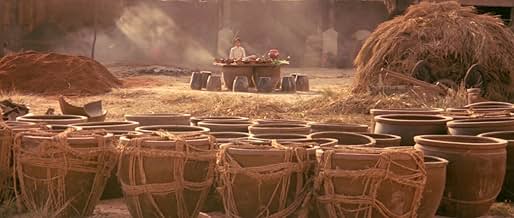Quando il padrone di un'azienda vinicola affetto dalla lebbra nella Cina del 1930 muore pochi giorni dopo il proprio matrimonio combinato, la sua giovane vedova è obbligata a gestire l'azien... Leggi tuttoQuando il padrone di un'azienda vinicola affetto dalla lebbra nella Cina del 1930 muore pochi giorni dopo il proprio matrimonio combinato, la sua giovane vedova è obbligata a gestire l'azienda vinicola per potersi guadagnare da vivere, mentre si trova a combattere con i banditi, ... Leggi tuttoQuando il padrone di un'azienda vinicola affetto dalla lebbra nella Cina del 1930 muore pochi giorni dopo il proprio matrimonio combinato, la sua giovane vedova è obbligata a gestire l'azienda vinicola per potersi guadagnare da vivere, mentre si trova a combattere con i banditi, il suo amante alcolizzato e l'armata Giapponese che invade il paese.
- Regia
- Sceneggiatura
- Star
- Premi
- 17 vittorie e 7 candidature totali
- Wo Luohan Yeye (Uncle Luohan)
- (as Rujun Ten)
Recensioni in evidenza
The trilogy has coherence both with regard to the themes and the style. In all three films a young woman is married with a much older man, giving rise of course to the temptation of adultery. All three films use bright colors, in particular red. In two of them the color red is also used in the title, in "Ju Dou" the bright colors are due to the fact that the film is situated in a wool dyeing factory.
"Red Sorghum" was Zhang Yimou's debut film and (thus) also his first co-operation with lead actress Gong Li. Some lack of routine is visible by both, for example in the mixing up of genre conventions of relationship drama, Western and war movie. The last element is probably added to please the Chinese censor. In later films Zhang Yimou turned out to be more brave in this resect.
The official (old) husband of lead actress Gong Li dies early in the movie (under suspect circumstances), and she inherits his distillery. In the rest of the movie Gong Li has a relationship with two men. One is physically attractive, impulsive, showing up only now and then and the father of her child. To the other she can talk, he is toughtful, ever present and is helping to raise her child. The lead character gives the impression that she doesn't mind this division of labor, proving her to be an independent and strong woman.
The story takes place on the eve of the Japanese occupation before World War II and later features some ugly scenes from their invasion. There is an underlying motif regarding feminism (a lot of this generation of Chinese directors seemed to deal with this) and the inability of females to be even remotely empowered in this time and place. I enjoyed seeing the class boundaries and customs of late-Qing China, the occasionally goofy sense of humor, and the almost lawless, ruthless communities out in the desert.
The film takes place in only a handful of locations, but features some gorgeous cinematography. The vibrant red colors (perhaps an allusion to Communist rule and foreshadowing bloodshed? It's hard to tell whether this film is for or against Communist China) are illustrated vividly by the sorghum wine and the long views of the sun setting across the Chinese desert. The pacing is slow but efficient and the story is a memorable one.
It's quite indisputable (to me, at least!) that, although this was Yimou Zhang's first film, it's loads better than his later movies, "Hero" and "House of Flying Daggers". Hopefully one day he'll catch up to where he started.
Gong Li stars as the betrothed of an old leprous wine maker. The film opens with her being carried in a covered sedan chair to the consummation of her wedding by a rowdy crew from the sorghum winery. It is the 1930s or a little before. They joust her about according to tradition and sing a most scary song about how horrible her life is going to be married to the leprous old man. Through a break in the sedan's enclosure as she sits alone in fear and dread she catches sight of Jiang Wen, a burly, naturalistic man with a piercing countenance. A little later after a bit of unsuccessful highway robbery during which she is released from her confinement, they exchange meaningful glances. The young man doing the voice-over identifies them as his Grandmother and Grandfather. (Obviously the leprous old man is going to miss out!)
Zhang Yimou's technique here, as in all of his films that I have seen, is to tell a story as simply as possible from a strong moral viewpoint with as little dialogue as possible and to rely on sumptuous sets, intense, highly focused camera work, veracious acting by a carefully directed cast, and of course to feature the great beauty of his star, the incomparable and mesmerizing Gong Li. If you haven't seen her, Red Sorghum is a good place to start. Jiang Wen is also very good and brings both a comedic quality to the screen as well as an invigorating vitality. His courageous and sometimes boorish behavior seems exactly right.
I should warn the viewer that this film contains striking violence and would be rated R in the United States for that and for showing a little boy always naked and for the "watering" of the wine by Jiang Wen and the boy. Indeed the film is a little crude at times and represents a view of pre-communist China and its culture that the present rulers find agreeable. The depiction of the barbarity and cruelty of the Japanese soldiers is accurate from what I know, but I must say that this film would never have seen the light of day had communist soldiers been depicted in such a manner.
Nonetheless the treatment is appropriate since Red Sorghum is a masculine, lusty film suggesting the influence of Akira Kurosawa with perhaps a bit of Clint Eastwood blended in. There are bandits and tests of manhood. The men get drunk and behave badly. Masculine sexual energy is glorified, especially in the scene where Jiang Wen carries Gong Li off to bed, holding her like a barrel under his arm, feet forward, after having "watered" her wine as though to mark his territory. The camera trailing them shows her reach up and put her arms around his neck and shoulder as much in sexual embrace as in balance.
Obviously this is Zhang Yimou before he became completely enamored of the feminist viewpoint; yet somehow, although Gong Li is allowed to fall in love with her rapist (something not possible in contemporary American cinema), Zhang Yimou manages to depict her in a light that celebrates her strength as a woman. One can see here the germination of the full blown feminism that Zhang Yimou would later develop in the aforementioned Raise the Red Lantern, Ju Dou and Qiu Ju.
As usual in Zhang Yimou's films not only are the sets gorgeous but the accompanying accouterments--the pottery, the costumes, the lush verdure of the sorghum fields, even the walls and interiors of the meat house restaurant/bar and Gong Li's bedroom--are feasts for the eyes, somehow looming before cinematographer Gu Changwei's camera more vividly than reality.
There are some indications here however that Zhang Yimou had not yet completely mastered his art, and indeed was working under the constraint of a limited budget. For example there was no opening in the sedan through which Gong Li could see Jiang Wen, and there shouldn't have been one (a peephole maybe). The pouring of the wine (into presumably empty bowls that obviously already contained wine) by Jiang Wen needed more practice. In his later films Zhang Yimou would reshoot such scenes to make them consistent with the audience's perception. Additionally, Gong Li's character was not sufficiently developed early on for us to appreciate her confident governance of the winery she had inherited. "Uncle" Luohan's apparently jealous departure from the winery and his implied relationship with and loyalty to Gong Li were also underdeveloped.
However these are minor points: in what really matters in film making--telling a story and engaging the audience in the significance and the experience of the tale--in these things Zhang Yimou not only excelled, but gave promise of his extraordinary talent that would be realized in the films to come. See this by all means, but don't miss his Raise the Red Lantern, in my opinion one of the greatest films ever made.
(Note: Over 500 of my movie reviews are now available in my book "Cut to the Chaise Lounge or I Can't Believe I Swallowed the Remote!" Get it at Amazon!)
This film is like a quiet fairy tale that transforms into something that I didn't see coming. The visuals are stunning. The story slowly unfolds but is presented so well that it's completely compelling. The acting is as good as it gets. And the ending hits you like a punch in the stomach.
This films stands out from all other Chinese films I have seen. It has a character uniquely its own, and is well worth seeking out.
Lo sapevi?
- QuizThe films screenplay was based on the novel of the same name by Chinese author Mo Yan. In 2012, Mo Yan was awarded the Nobel Prize in Literature. The Swedish Academy awarded him the prize as an author "who with hallucinatory realism merges folk tales, history and the contemporary".
- ConnessioniFeatured in The Turandot Project (2000)
I più visti
- How long is Red Sorghum?Powered by Alexa
Dettagli
Botteghino
- Lordo in tutto il mondo
- 108.371 USD
- Tempo di esecuzione1 ora 31 minuti
- Mix di suoni
- Proporzioni
- 2.35 : 1
Contribuisci a questa pagina






















